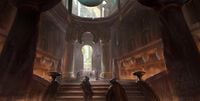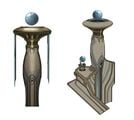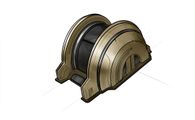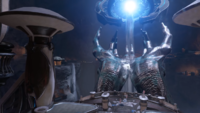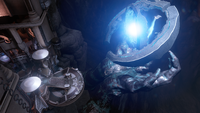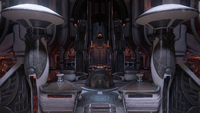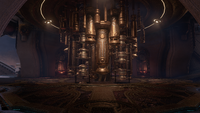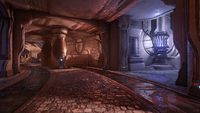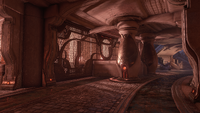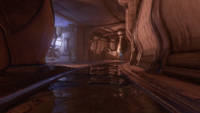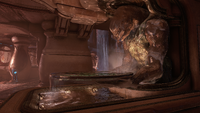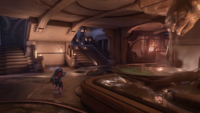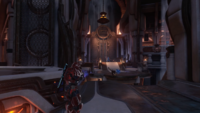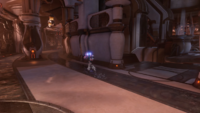Mercy
From Halopedia, the Halo wiki
| Mercy | |
|---|---|
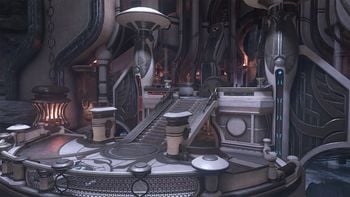
| |
| Map overview | |
|
Game: |
|
|
Map file name (?): |
|
| Lore information | |
|
Location: |
Ancient temple, Sanghelios[1] |
| Gameplay overview | |
|
Terrain: |
|
|
Map layout: |
Symmetrical[1] |
|
Recommended number of players: |
8 |
|
Recommended gametype(s): |
|
| “ | Death and Prayers for the Gods. | ” |
Mercy is a Halo 5: Guardians multiplayer map set on Sanghelios. The map is a remake of Haven from Halo 4.[1][2]
Universe and lore[edit]
Mercy is set on Sanghelios within an ancient Sangheili temple dedicated to the Forerunners. The temple is centered around a Forerunner artifact that produces healing waters enriched with nootropic compounds and microscopic sprites that soothe the mind and can even heal the most grievous wounds. Ancient Sangheili architects built the temple out of stone and metal, housing vesper bells, scriptoriums, and oracular pools.[1][2]
The temple was sealed away by the San'Shyuum for two millennia, only being accessed one more after the fall of the Covenant. This lead to the temple halls to once again ring with songs of victory while kaidons clad in traditional clothing drink herb-laced droughts and consult the records archives before planning their next campaign, as they did in the days long before the Covenant.[1][2] In the modern era, the temple has been retrofit with modern Sangheili technology and is decorated with Swords of Sanghelios banners.[1][3]
Overview[edit]
Layout[edit]
Virtually identical in layout to Halo 4's Haven, Mercy is a medium-sized symmetrical map with a two-level semi-circular layout featuring long sightlines and funneled pathways. It was designed to excel in Slayer and Strongholds game modes. For its first appearance within arena matchmaking in Halo 5: Guardians, the Halo 2 Beam Rifle can be found at the "Open Deck" callout.[1][3]
Callouts[edit]
The following are locations on the map that are so named on the player's heads-up display during gameplay:
|
|
Production notes[edit]
- As a remake of Haven, a map which had only first appeared in Halo 4, the development team wished for Mercy to have a main visual landmark reminiscent of the Forerunner themes from the original map while also maintaining its otherworldliness in a way that would take the general aesthetic as far away from the previous version as possible. To accomplish this, they switched the palette from futuristic Forerunner to ancient Sangheili. The development team behind the map's skybox came up with the idea to relocate the map from the clouds to below ground within a large cavern, allowing for a major change in lighting.[1]
- During development, the main visual pitch of the map was expressed as "Ancient Sangheili Water Temple," as a nod to a classic game "water temple" level design trope. From there, the team had the idea of replacing the long hallway floor panels from Haven with water channels while also including recessed fire chambers to provide light to the outer halls as a form of contrast.[1]
- The main goal for the mood of the level was for it to be a "living" temple that was still used by the Sangheili in modern times, reminiscent of real-world locations like the Notre Dame Cathedral. This aspect push the team to bring a lot of movement to the map: running water, roaring fires, flickering shadows, dancing caustics, moving chains, and counter-weight machinery. It also allowed the team to establish a unique mid-point between the two periods of Sangheili architecture from the Halo 5: Guardians' campaign, which was composed of either ancient ruins or modern urban environments. An ancient temple, still maintained and in use, let the team create a version of the ruins from the campaign that would have previously existed, before time took its toll on the abandoned place, and much of the valuable metals and stones were stripped from the structure. Additionally, the team "retrofit" the nooks and crannies of the temple with more modern Sangheili technology.[1]
Gallery[edit]

|
Browse more images in this article's gallery page. |
Development images[edit]
Screenshots[edit]
Spartan-IVs fight near the fountain.
An Indomitable-clad Spartan-IV runs through the water in a hallway.
Sources[edit]
| |||||||||||||||||||||||||||||||||||
